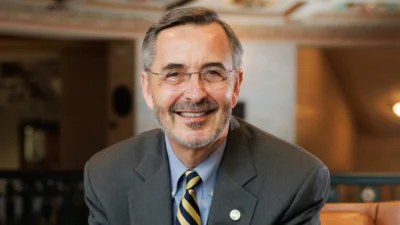Santa J. Ono, Ph.D. President at University of Michigan - Ann Arbor | LinkedIn
Santa J. Ono, Ph.D. President at University of Michigan - Ann Arbor | LinkedIn
Every presidential election season brings national security concerns, and the 2024 campaign is no exception. The current environment is shaped by the attempted assassination of former President Donald Trump at a campaign event, threats of wider war in the Middle East, and ongoing cyberattacks.
Javed Ali, associate professor of practice at the University of Michigan’s Ford School of Public Policy and former senior U.S. government counterterrorism official, elaborated on these risks and their implications for the campaigns and the country.
"There’s been a major security presence there already, and the planning for that has been going on for several months, if not longer," Ali stated. He emphasized that significant events such as national conventions are usually designated as national security special events. "That means between the Secret Service and the Department of Homeland Security, they plan all the security arrangements for these things."
Ali noted that lessons would likely be learned from last month's assassination attempt on Trump. "Even though this is an inside event, there’s still probably small things they have looked at and perhaps tweaked to make sure the possibility of that lone shooter threat to people even trying to come inside the building is minimized to the greatest extent possible."
Discussing broader geopolitical tensions, Ali referenced recent Israeli targeted strikes against senior Hezbollah commanders in Beirut and Hamas political leaders in Tehran. These actions raised concerns about potential regional conflicts. However, despite vows of retaliation from Hezbollah's leadership and Iran's supreme leader, no significant response has occurred yet.
"Maybe it’s because cooler heads have prevailed," Ali suggested. He added that parties might be waiting for a ceasefire between Israel and Hamas to end ongoing hostilities.
On election interference by foreign actors like Russia, China, Iran, Venezuela, among others, Ali warned about continued attempts to influence U.S. elections through misinformation propagated via social media. He highlighted more sinister threats involving direct interference with electronic voting infrastructure.
"The Russians tried that in 2016," he said. "I also think that all the countries I just mentioned are probably scanning and probing for those electronic vulnerabilities." Any such interference would provoke a significant U.S. response.
In conclusion, Ali stressed proactive planning: "Planning for these things now is the right thing to do... working with all of their counterparts at state and local levels throughout the entire United States to make sure we have the best security we can."






 Alerts Sign-up
Alerts Sign-up